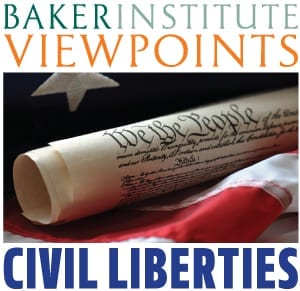 Legal scholars, activists, academics and law enforcement have all questioned the impact of the drug war on civil liberties. Many argue that like the prohibition of alcohol, the drug war has diminished civil liberties, particularly in the areas of search and seizure and the right to privacy. These issues could not be more timely given the changing landscape of drug policy in America. Pew and Gallup polls have indicated, for the first time, that a majority of Americans believe that marijuana should be legal. This change in public opinion is no doubt related to medical marijuana laws in 18 states and the District of Columbia and the legalization of marijuana for recreational uses by popular referendums in Colorado and Washington.
Legal scholars, activists, academics and law enforcement have all questioned the impact of the drug war on civil liberties. Many argue that like the prohibition of alcohol, the drug war has diminished civil liberties, particularly in the areas of search and seizure and the right to privacy. These issues could not be more timely given the changing landscape of drug policy in America. Pew and Gallup polls have indicated, for the first time, that a majority of Americans believe that marijuana should be legal. This change in public opinion is no doubt related to medical marijuana laws in 18 states and the District of Columbia and the legalization of marijuana for recreational uses by popular referendums in Colorado and Washington.
In the final post of a four-part Baker Institute Viewpoints series, we ask: Will legalizing marijuana improve civil liberties?
More from this series:
May 20, 2013 — “Restoring civil liberties through sensible marijuana policies“
May 17, 2013 — “How the war on drugs has infringed on U.S. civil liberties”
May 16, 2013 — “Will legalizing marijuana improve civil liberties?“
“Would marijuana legalization improve civil liberties?” At first, the answer might appear obvious. Legalization would improve civil liberties, the argument goes, simply because it would necessitate less government intrusion on individual choices.
A fact often left out of this discussion is the practical reality that today the private, personal use of marijuana is rarely pursued by law enforcement. Indeed the answer to the above question is more nuanced than advocates might lead us to believe.
The argument that legalization would improve civil liberties rests on the notion that if marijuana was legal, there would be less of a need for the criminal justice system intruding on the lives of otherwise peaceful marijuana smokers. But it is unclear that legalization would greatly reduce criminal justice (specifically law enforcement) involvement in society. Already, only about two-tenths of 1 percent of all prison inmates appear to be incarcerated in prison simply for marijuana use.[i] Data from the “Survey of Inmates in Federal and Correctional Facilities” finds that the “number of marijuana users in prison [only] for their use is perhaps 800-2,300 individuals or on the order of 0.1-0.2 percent of all prison inmates.”[ii] Researchers estimated that the resulting expected time served in prison per year of use for marijuana was .04 days. And federal prisons certainly do not focus on simple users — the median amount of marijuana for those convicted of marijuana possession is 115 pounds (or 156,000 marijuana cigarettes).[iii] Of course, prison is not the only measure of law enforcement activity. About 700,000 arrests are made yearly for marijuana possession. Some of those arrests result in jailing. Put in context of overall use, however, the chance for arrest is one in every 11,000 to 12,000 joints smoked. The probability of being arrested during a year of monthly consumption rises to about 3 percent for adults and 6 percent for adolescents.[iv] Many of these arrests are made in the context of traffic stops or public use. Under most legalization proposals, driving with marijuana in the car or smoking in public would remain illegal.
From a macro perspective, regulations governing legal alcohol result in more criminal justice involvement than marijuana. Over 2.3 million arrests are made annually for alcohol regulation violations (e.g., public use or selling to minors) — far more arrests than for all illegal drugs combined. That is because so many more people use substances when they are legal, widely available, accepted, and normalized.
Since legalization would increase use, it is important to briefly dwell on the possibility that legalization might decrease civil liberties, especially for vulnerable populations like children. Marijuana smoking during pregnancy has been shown to decrease birth weight, most likely due to the effects of carbon monoxide on the developing fetus.[v] Marijuana addicts 1 out of every 6 children who ever try the drug.[vi] Marijuana affects the developing brain in acute ways; one recent study found that persistent, heavy young users had on average 6-8 lower IQ points by age 38 relative to non-users (even if heavy use stopped in adulthood)[vii]. Additionally, a number of studies have found that people who use marijuana are more likely to drop out of school, and subsequently face unemployment, be dependent on social welfare, and experience a lower self-reported quality of life than people who don’t use marijuana.[viii] An exhaustive meta-analysis examining four-dozen different studies by Macleod and colleagues who found that marijuana use is consistently associated with reduced grades and a lower chance of graduating from school.[ix]
Marijuana’s harm extends beyond that done to the individual. Marijuana intoxication at least doubles the risk of getting into a car accident[x]; costs from marijuana-related hospital stays are substantial[ii]; marijuana addiction costs the state money for treatment; etc.
John Stuart Mill famously wrote that “… over himself, over his own body and mind, the individual is sovereign.” Mill argued that “The only purpose for which power can be rightfully exercised over any member of the community, against his will, is to prevent harm to others.” Since marijuana can cause addiction, forcing people to lose control over their own self and in the process inflict harms onto others, its use can decrease overall civil liberties. And since legalization would undoubtedly increase marijuana use in society, we might expect a reduction, not increase, in civil liberties if marijuana was legalized.
[i] Bureau of Justice Statistics, 2004. Survey of Inmates in State Correctional Facilities, Special Tabulations. Data collected from www.bjs.gov/index.cfm?ty=dcdetail&iid=275.
[ii] Caulkins and Sevigny. “How many people does the U.S. imprison for drug use, and who are they?” Contemporary Drug Problems.
[iii] U.S. Sentencing Commission (2011). Annual Report. Accessed at www.ussc.gov/Data_and_Statistics/Annual_Reports_and_Sourcebooks/2011/ar11toc.htm.
[iv] Kilmer, B. et al. “Altered State? Assessing How Marijuana Legalization in California Could Influence Marijuana Consumption and Public Budgets.” RAND Drug Policy Research Center, 2010.
[v] Hall W & Degenhard L (2009). Adverse health effects of non-medical marijuana use. Lancet, 374:1383-1391.
[vi] Anthony JC, Warner LA, Kessler RC (1994): Comparative epidemiology of dependence on tobacco, alcohol, controlled substances, and inhalants: Basic findings from the National Comorbidity Survey. Experimental and Clinical Psychopharmacology 2: 244 – 268
[vii] Meier et al. (2012). Persistent marijuana users show neuropsychological decline from childhood to midlife. Proceedings of the National Academy of Sciences.
[viii] Fergusson, D. M. and Boden, J. M. (2008), Marijuana use and later life outcomes. Addiction, 103: 969–976.
[ix] Macleod, J.; Oakes, R.; Copello, A.; Crome, I.; Egger, M.; Hickman, M.; Oppenkowski, T.; Stokes-Lampard, H.; and Davey Smith, G. Psychological and social sequelae of cannabis and other illicit drug use by young people: A systematic review of longitudinal, general population studies. Lancet 363(9421):1579-1588, 2004.
[x] Marijuana impaired driving twice as likely to crash (Britain Medical Journal) found at:
[ii] Pacula, et al. “An Examination of the Nature and Cost of Marijuana Treatment Episodes.” RAND Working Paper presented at the American Society for Health Economics Annual Meeting, Durham, N.C., June 2008.
 Kevin A. Sabet, Ph.D., has worked on drug policy issues for more than 18 years. He, is currently director of the Drug Policy Institute at the University of Florida and an assistant professor in the university’s College of Medicine, Department of Psychiatry. He is the founder, with Patrick J. Kennedy, of Project SAM (Smart Approaches to Marijuana). From 2009-2011, he served in the Obama administration as the senior adviser to Director R. Gil Kerlikowske at the White House Office of National Drug Control Policy. He is also the president of Policy Solutions Lab, a consulting firm that works with numerous domestic and international organizations.
Kevin A. Sabet, Ph.D., has worked on drug policy issues for more than 18 years. He, is currently director of the Drug Policy Institute at the University of Florida and an assistant professor in the university’s College of Medicine, Department of Psychiatry. He is the founder, with Patrick J. Kennedy, of Project SAM (Smart Approaches to Marijuana). From 2009-2011, he served in the Obama administration as the senior adviser to Director R. Gil Kerlikowske at the White House Office of National Drug Control Policy. He is also the president of Policy Solutions Lab, a consulting firm that works with numerous domestic and international organizations.